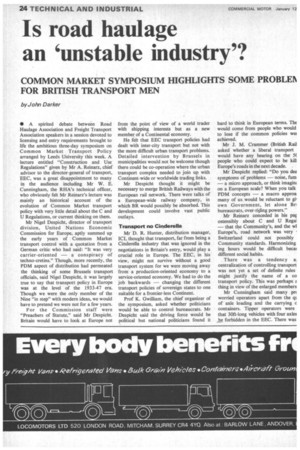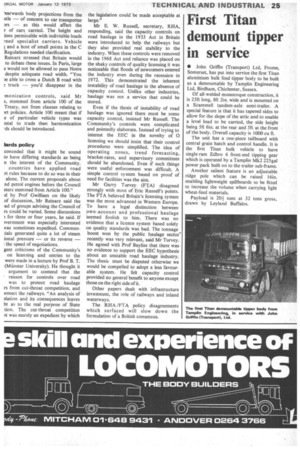Is road haulage an 'unstable industry'?
Page 26

Page 27

If you've noticed an error in this article please click here to report it so we can fix it.
COMMON MARKET SYMPOSIUM HIGHLIGHTS SOME PROBLE11 FOR BRITISH TRANSPORT MEN
by John Darker • A spirited debate between Road Haulage Association and Freight Transport Association speakers in a session devoted to licensing and entry requirements brought to life the ambitious three-day symposium on Common Market Transport Policy arranged by Leeds University this week. A lecture entitled "Construction and Use Regulations" given by Mr A. Reinarz, chief advisor to the director-general of transport, EEC, was a great disappointment to many in the audience including Mr W. E. Cunningham, the RHA's technical officer, who obviously felt Mr Reinarz's lecture was mainly an historical account of the evolution of Common Market transport policy with very little detail about the C and U Regulations, or current thinking on them.
Mr Nigel Despicht, director of transport division, United Nations Economic Commission for Europe, aptly summed up the early years of Common Market transport control with a quotation from a German critic who had said: "It was very carrier-oriented — a conspiracy of techno-cretins." Though, more recently, the PDM aspect of distribution had permeated the thinking of some Brussels transport officials, said Nigel Despicht, it was largely true to say that transport policy in Europe was at the level of the 1933-47 era_ Though we were the only member of the Nine "in step" with modern ideas, we would have to pretend we were not for a few years.
For the Commission staff were "Preachers of Statute," said Mr Despicht. Britain would have to look at Europe not from the point of view of a world trader with shipping interests but as a new member of a Continental economy.
He felt that EEC transport policies had dealt with inter-city transport but not with the more difficult urban transport problems. Detailed intervention by Brussels in municipalities would not be welcome though there could be co-operation where the urban transport complex needed to join up with Continent-wide or worldwide trading links.
Mr Despicht thought it might be necessary to merge British Railways with the European rail network. There were talks of a European-wide railway company, in which BR would possibly be absorbed. This development could involve vast public outlays.
Transport no Cinderella
Mr D. R. Hunter, distribution manager, ICI, thought that transport, far from being a Cinderella industry that was ignored in the negotiations in Britain's entry, would play a crucial role in Europe. The EEC, in his view, might not survive without a good transport system for we were moving away from a production-oriented economy to a service-oriented economy. We had to do the job backwards — changing the different transport policies of sovereign states to one suitable for a frontier-less Continent.
Prof K. Gwilliam, the chief organizer of the symposium, asked whether politicians would be able to control bureaucrats. Mr Despicht said the driving force would be political but national politicians found it hard to think in European terms. The would come from people who would to lose if the common policies wei achieved.
Mr J. M. Crammer (British Rail asked whether a liberal transport would have any bearing on the 5( people who could expect to be kill Europe's roads in the next decade. .
Mr Despicht replied: "Do you dea symptoms of problems — noise, film — a micro approach, or think imagim on a European scale? When you talk PDM concepts — a macro approa. many of us would be reluctant to gil own Government, let alone Bri bureaucrats, over-ricling powers."
Mr Reinarz conceded in his par ostensibly about C and U Regal — that the Community's, and the wl Europe's, road network was very , Switzerland could not possibly Community standards. Harmonizing ing hours would be difficult bean different social habits.
There was a tendency al centralization of controlling transport was not yet a set of definite rules might justify the name of a co transport policy. This was perhaps e thing in view of the enlarged members Mr Cunningham said many pit: worried operators apart from the qt of axle loading and the carrying a containers. Tipper operators were that 30ft-long vehicles with four axles be forbidden in the EEC. There was varwards body projections from the ode — of concern to car transporter )rs — as this would affect the r of cars carried. The height and ions permissible with indivisible loads rned specialist carriers. Vehicle ; and a host of small points in the C Regulations needed clarification.
Reinarz stressed that Britain would to debate these issues. In Paris, large s would not be allowed to pass Notre despite adequate road width. "You )e able to cross a Dutch B road with truck — you'd disappear in the
monization controls, said Mr z, stemmed from article 100 of the Treaty, not from clauses relating to wt policies. Article 100 meant that if e of particular vehicle types was mtal to trade then harmonization -ds should be introduced.
lards policy
conceded that it might be sound to have differing standards as being n the interest of the Community. countries have applied road rt rules because to do so was in their alone. The current proposals about ad petrol engines before the Council sters stemmed from Article 100."
..c1 by Prof Gwilliam on the likely of discussion, Mr Reinarz said the ad of groups advising the Council of rs could be varied. Some discussions for three or four years, he said. If wernment was especially interested vas sometimes expedited. Commun:ids generated quite a lot of steam ional pressure — or its reverse the speed of negotiations.
gent criticisms of the Community's on licensing and entries to the were made in a lecture by Prof B. T. (Munster University). He thought it argument to contend that the reason for controls over road was to protect road haulage rs from cut-throat competition, and protect the railways. "An analysis of station and its consequences leaves bt as to the real purpose of State tion. The cut-throat competition it was merely an expedient by which the legislation could be made acceptable at large."
Mr E. W. Russell, secretary, RHA, responding, said the capacity controls on road haulage in the 1933 Act in Britain were introduced to help the railways but they also provided real stability to the industry. When these controls were removed in the 1968 Act and reliance was placed on the shaky controls of quality licensing it was noticeable that floods of newcomers entered the industry even during the recession in 1972. This demonstrated the inherent instability of road haulage in the absence of capacity control. Unlike other industries, haulage was not a service that could be stored.
Even if the thesis of instability of road haulage was ignored there must be some capacity control, insisted Mr Russell. The Community's controls were complicated and pointedly elaborate. Instead of trying to interest the EEC in the novelty of 0 licensing we should insist that their control procedures were simplified. The idea of operating zones, trend forecasting, bracket-rates, and supervisory committees should be abandoned. Even if such things were useful enforcement was difficult. A simple control system based on proof of need for facilities was the aim.
Mr Garry Turvey (FTA) disagreed strongly with most of Eric Russell's points. The FTA believed Britain's licensing system was the most advanced in Western Europe. To have a legal distinction between own-account and professional haulage 'seemed foolish to him. There was no evidence that a licence system based solely on quality standards was bad. The tonnage
boost won by the public haulage sector. recently was very relevant, said Mr Turvey.
He agreed with Prof Bayliss that there was no evidence to support the EEC hypothesis about an unstable road haulage industry.
The thesis must be disputed otherwise we would be compelled to adopt a less favourable system. He felt capacity control provided no general benefit to anyone except those on the right side of it.
Other papers dealt with infrastructure investment, the role of railways and inland waterways.
The RHA /FTA policy disagreements which surfaced will slow down the formulation of a British consensus.








































































































